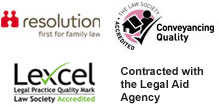| Challenge to Will's Validity Rejected by High Court | |
| Court of Appeal Overturns Will Dispute Ruling | |
| Will Execution - Remote Witnessing Legislation Expires | |
| More... | |

Who is Under the Influence?
The law recognises that some people (such as solicitors or accountants) have a high degree of influence over other people (their clients), since clients hire their professional advisers for the specific purpose of giving advice.
However, it is not normally with regard to professional advice that undue influence claims come into being. Normally these arise when someone has been influenced by another person to do something which is to the first person's detriment and which normally is for the benefit of the other.
In ordinary relationships it is hard to demonstrate that undue influence exists. To do so, the person asserting that undue influence has been exercised must demonstrate in regard to the transaction in question that:
- he or she placed trust in and confidence in the defendant; and
- that the transaction is not readily explicable bearing in mind the relationship subsisting between the parties.
The courts have over the years addressed themselves to this issue many times, but with the circumstances of each case varying substantially it has been difficult to establish anything more than general principles. The most important of these are that one must look at the nature of the transaction and the relationship between the parties to transfer to the defendant the burden of proof that undue influence was not applied.
Two recent cases have illustrated this. In the first, an elderly couple, one of whom was dying, bought their council house subject to a sixty percent discount and transferred the title to their son. In exchange for this, the son paid the mortgage and allowed them to live in it rent free. The son had 'driven' the arrangement. There was, it seemed, evidence of undue influence.
The son's successful rebuttal of the claim was based on the arguments that his parents would not have bought the property had he not taken the steps he did and furthermore, they acquired the right to stay in their home rent free for life. Under their agreement with their son, they would also regain their beneficial interest in the house if the son failed to make the mortgage payments.
The second case also dealt with a council house purchase. Here, a mother agreed (by means of a trust deed created at the time the house was bought) that when she sold the house, the sale proceeds would pass to her son. Her son paid the mortgage payments and she lived rent free in the property. Some years later she decided to terminate the agreement.
Here the circumstances were different. When she was a council tenant, the mother’s rent was paid through housing benefit. The practical effect of the arrangement she had entered into was the loss of both her security of tenure and the obligation on her landlord to keep the property in repair. If her son failed to make the mortgage payments, she could lose her home. In any event, the trust deed prevented her from selling the house. In this case, the court found that there was sufficient evidence of undue influence by the son. The absence of a clause that protected the mother if her son failed to make the mortgage payments apparently was a key difference between the two arrangements.
More recent cases have further muddied the waters as regards the circumstances in which undue influence will be able to be demonstrated. However, it is clear that it requires a considerable weight of evidence to be put before the court before it will rule that undue influence has occurred.
|
|
|
 Where arrangements such as this are being contemplated, the most sensible approach is for both parties to take independent professional advice. We can assist in any property or trust matter.
Where arrangements such as this are being contemplated, the most sensible approach is for both parties to take independent professional advice. We can assist in any property or trust matter.


